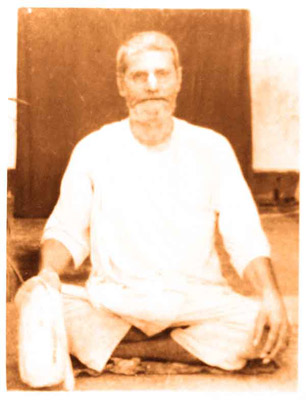Special On-line Edition for the Disappearance Day of
Śrī Śrīmad Bhakti Prajñāna Keśava Gosvāmī Mahārāja
śrī śrī guru gaurāṅga jayataḥ!

Year-2, Special On-line Edition
Posted: 4 October, 2009
Dedicated to
nitya-līlā praviṣṭa oṁ viṣṇupāda
Śrī Śrīmad Bhakti Prajñāna Keśava Gosvāmī Mahārāja
Inspired by and under the guidance of
Śrī Śrīmad Bhaktivedānta Nārāyaṇa Gosvāmī Mahārāja
Appearing in English for the first time
Śrī Bhagavān is not for the Weak-hearted
A letter from Śrī Śrīmad Bhakti Prajñāna Keśava Gosvāmī Mahārāja

Śrī Keśavajī Gauḍīya Maṭha
Kaṁsa Ṭīla, Mathurā
November 23, 1960
śrī śrī guru gaurāṅga jayataḥ!
My dear one,
I have received your letters dated October 17 and November 14 and became especially pleased to learn from them that you are inclined to receive training in accordance with the principles enunciated in the revealed scriptures.
Svayam Bhagavān Śrī Gaurasundara has said, “kīrtanīyaḥ sadā hariḥ – always chant the glories of Śrī Hari.” And śāstra states, “kalau tadā-hari-kīrtanāt – in the age of Kali, deliverance is only achieved by performing hari-kīrtana.”
The significance of these statements is that the only way to become freed from material bondage is through the culture of hari-kīrtana. That is to say, only by discussing the glories and message of Śrī Hari can all living beings become liberated and thus qualified to serve Śrī Bhagavān.
It is a source of deep happiness for me that you are always performing kīrtana by discussing hari-kathā with everyone, in a way that is appropriate according to time, place and circumstance. You must fearlessly speak the message of Śrī Hari.
In the teachings of Śrīman Mahāprabhu we will not find even the slightest trace of diversion from scripture, nor any poor logic or inconsistency. All other propagators of religion, namely so-called religious sampradāyas (schools of thought) and their ācāryas (chief preceptors), have attained, or yearn to attain, fame and reputation in modern society by presenting their fanciful speculations, whether narrow or broad. But their opinions oppose the conclusions of scripture and lack logic. Therefore, it is absolutely essential to speak the truth courageously.
Śrī Bhagavān is not for the weak-hearted. In the Muṇḍaka Upaniṣad (1.6.4) it has been said, “nāyamātmā balahīnena labhyaḥ – The Absolute Reality, that Supreme Soul, is not accessible to those who have no spiritual strength.” But cowards manipulate religion with false interpretations, proclaiming “all are correct, all are correct”, and thus reveal the feebleness of their conception of bhajana. You must rigorously protest against these spurious assertions. If necessary, I am personally ready to discuss this in an open forum.
You may inquire of those who attempt to assert that the featureless, impersonal brahma – that is, the undifferentiated, all-pervading spirit – is the Supreme Absolute Truth (para-tattva), “Why is it so often seen in scripture that the word brahma has been prefixed with para (Supreme Absolute)?” The name Para-brahma is employed to indicate a higher tattva, or existential truth, than just impersonal brahma. In other words, it points us toward the Supreme, Absolute Entity. Hence, impersonal brahma is not para-tattva, the Supreme Absolute Truth. I will discuss this with you further when we meet.
Knowledge of impersonal brahma is knowledge of the negative aspect of Bhagavān; while knowledge of Bhagavān, the Supreme Person Himself, is knowledge of the positive aspect. Negative ideas have no intrinsic value. Śrī Kṛṣṇa Himself spoke Bhagavad-gītā, and Śrī Kṛṣṇa Himself is the refuge of the all-pervading spirit (brahma): “brahmaṇo hi pratiṣṭhāham – I am the basis and shelter of brahma” (Bhagavad-gītā 14.27). You ought to make people thoroughly understand this statement.
The word viṣṇu appears in many places throughout the Vedas and every single brāhmaṇa priest utters this transcendental name every time he sanctifies himself with water. Still, when demoniac people hear the name Viṣṇu, they are filled with fear. I cannot fully elaborate on this topic within the scope of this letter.
Regarding your last question, if someone wants to enter worldly life, he must surely gain some kind of knowledge for the sake of earning his livelihood. But the topmost knowledge, of course, is all-auspicious, spiritual knowledge.
I conclude here.
With blessings,
Śrī Bhakti Prajñāna Keśava
Translated from Śrī Gauḍīya Patrikā, Year 28, Issue 3
by the Rays of The Harmonist team
![]()





